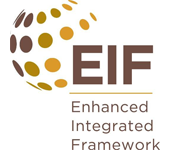Enhanced Integrated Framework (EIF)

The EIF is the only programme dedicated to support the LDCs in harnessing trade and Aid for Trade to promote inclusive and sustainable growth and development. All EIF Partners – 48 LDCs, 3 graduated counties, 24 Donors and 8 International Organizations – work together to achieve a common goal.
The added value of the EIF is recognized in the Sustainable Development Goals (SDGs) in Target 8a, which states: "Increase Aid for Trade support for developing countries, in particular least developed countries, including through the Enhanced Integrated Framework."
The EIF's work is at the heart of Goal 17 and its Target 17.11 looking to "Significantly increase the exports of developing countries, in particular with a view to doubling the least developed countries' share of global exports by 2020." The role of the EIF is also acknowledged in the Addis Ababa Action Agenda on Financing for Development and the Istanbul Programme of Action.
Following a successful EIF Pledging Conference in Nairobi in 2015 where EIF Donors pledged US$90 million, 2016 marked an important milestone for the entire EIF partnership – the beginning of the second phase of the programme (2016-2022).
Four strategic goals mark the implementation of the EIF Phase Two:
- Strengthening institutions and policy mechanisms;
- Reducing supply-side constraints;
- Promoting gender equality and inclusive trade; and
- Leveraging key drivers for investments.
In 2016, the entire EIF partnership worked very hard at implementing the necessary reforms to become more efficient and effective in achieving value for money for a more sustained impact. The outcomes of this effort include:
- Finalizing the new Results Framework aligned with the SDGs and a risk matrix accompanying it;
- Finalizing the Medium-term Strategic Plan 2016-2018;
- Sharpening the EIF's analytical work – Diagnostic Trade Integration Studies (DTISs) – using an innovative and more flexible approach for a more targeted response to the evolving needs of the LDCs;
- Streamlining EIF processes and procedures to become more dynamic and agile;
- Introducing two new types of support to the EIF Countries: project preparation grants and sustainability support;
- Introducing an option of combining elements of institutional and productive capacity‑building projects;
- Strengthening the EIF partnership and its catalytic role to mobilize additional resources for sustainable impacts on the ground; and
- Rolling out of a new Management Information System for enhanced transparency as well as management efficiency.
These outcomes were presented to all EIF beneficiaries in the course of four regional workshops organized for the Pacific region, Asia and Anglophone and Francophone Africa.
How the EIF process and funding windows work in EIF Phase Two
EIF Phase Two has started on a solid ground of what has been achieved so far. To date, 44 DTISs have been completed or are under way, and around 30 DTISs (including DTIS Updates (DTISUs)) are envisaged over the next phase of the programme. Estimates vary, but over 120 projects identified as priorities by the EIF Countries in their DTISs/DTISUs have leveraged funding from donors.
Out of 44 institutional capacity‑building projects, around 90% integrated trade into their national development plans, and 65% formulated quality trade strategies. In addition, over 90% have regular government-donor consultation mechanisms.
The priorities identified in the DTIS Action Matrices resulted in 36 productive capacity‑building projects in 27 countries supported by the EIF, ranging from agricultural support, standards, textiles and tourism to trade facilitation.
EIF projects continue to evolve reflecting the countries' priorities. In 2017, the EIF received the first project with an e-commerce component aiming to help increase Bhutan's competitiveness after the DTIS in Bhutan made a significant emphasis on the importance of Information Communication Technology (ICT) and therefore highlighted several ICT-related priorities.
In 2017 the EIF will support around 20 new projects, including 4 DTIS/DTISUs, 6 institutional support projects and several productive capacity-building projects, following the "Leave no LDC behind" principle.
The EIF will also continue its outreach activities in the course of 2017. It will participate in the Global Review of Aid for Trade in July and the WTO Public Forum in September. The EIF will also take part in the WTO 11th Ministerial Conference in December. All these efforts will contribute to a successful replenishment conference in 2018 to ensure adequate funding for the successful implementation of Phase Two of the EIF.
